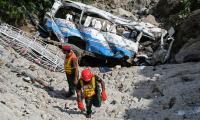ISLAMABAD: The federal government Thursday issued a notification banning Tehreek-i-Labbaik Pakistan (TLP) after around half a dozen state institutions termed it a serious threat to national security.
"The federal government has reasonable grounds to believe that TLP is engaged in terrorism," said a notification issued by the interior ministry. "TLP is engaged in terrorism, acted in a manner prejudicial to peace and security of the country, involved in creating anarchy in the country by intimidating the public, caused grievous bodily harm, hurt and death to the personnel of law enforcement agencies and innocent bystanders, attacked civilians and officials, created wide-scale hurdles, threatened, abused and promoted hatred, vandalized and ransacked public and government properties including vehicles and caused arson, blocked essential health supplies to hospitals, and has used, threatened, coerced, intimidated and overawed the government and the public and created a sense of fear and insecurity in the society and the public at large," read the notification.
"Now therefore in experience of the powers conferred by Section 11B (i) of the Anti-Terrorism Act, 1997 (XXVII of 1997), the federal government is pleased to list TLP in the first schedule to the said Act as a proscribed organization for the purposes of said act," concluded the notification.
After the ban, the TLP has become the 79th proscribed organization to enter the list of terror outfits maintained by the top counter-terrorism body, which has also put four organizations on its watch list.
The development came days after National Counter Terrorism Authority (Nacta) Pakistan and other organizations termed TLP a terrorist organization that had destroyed the state writ.
These institutions further observed that the TLP not only challenged, but also decimated the state writ and its emergence and continuity may be contested by other sects through shoring up of resources and competing acts of violence.
The Punjab Home Department and Nacta stated that TLP had paralysed public movement by obstructing roads, killing police personnel, burning public property and killing people across the country.
"The country has witnessed waves of sectarian and communal violence. TLP protests were also in violation of the provisions of National Action Plan including misuse of loudspeaker and hate speech, display of arms, ban on glorification of terrorism, militancy, and ban on armed militia," read the findings of Nacta.
"TLP has not been able to mobilise a large number of followers but managed enforcement of its demands. It is a highly serious and dangerous precedent. It can culminate into a vicious circle of violence for purposes that might be unlawful," observed the country's top counter-terrorism.
The Authority recommended that the state must not allow further erosion of its authority, and if required amendment to laws may be made to suffice the needs.
In order to avert such incidents in future, the government must strengthen the civil administration and law enforcement agencies, read the recommendations.
"Measures must be taken to boost the lowering morale of law enforcement forces. Cases registered against violent protestors must be expedited in courts. Cases registered in which police officials were assaulted and received injuries should be pursued vigorously. Anti-riot units must be raised, properly trained and equipped to tackle such situations," read the recommendations.
According to Geo News, Prime Minister Imran Khan and the federal cabinet earlier approved a summary moved by the interior ministry seeking a ban on TLP under the anti-terrorism law. After the summary was approved, the cabinet started working on the declaration.
The government will present the declaration in the Supreme Court. The Election Commission of Pakistan (ECP) will subsequently denotify the TLP on the orders of the apex court.
Prior to the issuance of notification, Interior Minister Shaikh Rashid addressed a press conference in which he said the designs of TLP were "dangerous".
Federal Minister for Religious Affairs Noorul Haq Qadri was also present. "They were adamant on coming to the Faizabad Interchange for the fourth time. This is why we took decisions to prevent that," Shaikh said.
The minister paid tribute to the police officers and law enforcement personnel injured in clashes with TLP activists. "I will visit the homes of those who were martyred and will also visit those who were injured [in the clashes]," he said.
Rashid said violence was unfortunate, as the government was willing to negotiate with the protesters. He said the government had not backed away from its promise to present a resolution of the religious party's demands in the Parliament.
"We got to know during negotiations that they [religious party] were planning a march on April 20," he said, adding that the reaction from the party after the arrest of a leader could not be justified.
"The reaction was neither in harmony with our religion nor the Constitution," he said. The minister said the cabinet had given its approval for banning TLP. He said the government will not allow any relaxation to those who spread anarchy across Pakistan, adding that their agenda will not succeed.
"No one is being allowed to go, no relaxation will be provided to them," he said. Speaking on the occasion, Noorul Haq Qadri said resorting to violence to protest the arrest of an individual was morally and religiously unacceptable.
Qadri said the government had never backtracked on its commitment to present a resolution in the National Assembly. He said the government was proposing a draft whose diplomatic repercussions would be minimum and which would not push the country into an international crisis.
He said while negotiations were underway, the government found out that TLP was preparing for staging a sit-in at Faizabad on April 20. He said the government had even offered constitution of a parliamentary committee that along with TLP could produce a draft with consensus, but TLP leadership did not agree to it and pressed for acceptance of their demands.
Qadri said though it was not the job of governments to make requests, they made full efforts to convince the TLP leadership. Referring to Rizvi's arrest, the minister said political leaders, religious leaders and business personalities were regularly arrested but "the kind of reaction shown by TLP could not be called moral or religious.
Earlier, Prime Minister Imran Khan chaired a meeting attended by federal ministers Shaikh Rashid Ahmad, Noor-ul-Haq Qadri, Fawad Chaudhry and others. The meeting discussed the country's security situation, particularly in light of the protests organised by TLP.
Shaikh Rashid Ahmed briefed the meeting on the law and order situation in the country. The meeting was told that TLP was being officially banned. The prime minister said armed groups could not be allowed to disturb peace in the country and pressure the state through violence.
According to the sources, the prime minister asked Qadri and Shaikh Rashid to take the nation and Ulema into confidence on banning TLP. He said the government held the Ulema and religious parties in high esteem but violence in the name of religion could not be allowed.
The prime minister said the government always took Ulema and Mashaikh into confidence on important decisions. Imran said he had raised his voice for protection of finality of prophethood (PBUH) at the international level and will continue doing so.
Ulema condemn TLP violence: Meanwhile, Ulema from different schools of thought Thursday condemned the ongoing violent protests by TLP, terming them immoral, inhumane, un-Islamic and unconstitutional.
Referring to different Islamic injunctions, the Ulema said killing and injuring police officials, creating roadblocks, resorting to violence and disrupting normal life in the name of Holy Prophet Muhammad (Peace Be Upon Him) and for fulfillment of demands was not permissible by Islam.
In their video messages, they were unanimous in their views that violent protests and attacks on the personnel of army, police or other security institutions should in no way be allowed by the government.
Maulana Raghib Naeemi said besides disturbing law and order in various parts of the country, such violent protests also caused economic loss and numerous problems to the people. He said instead of blocking roads and staging sit-ins, such gatherings should be dispersed after registering their protest over the issue.
Zia Ullah Shah Bukhari appealed to the religious leaders and protesters not to disrupt normal life and cause difficulties to the general public. Sahibzada Hamid Raza of Sunni Ittehad Council said they also carried out peaceful protests against the publication of blasphemous caricatures and the statement of French president but given the regional and international situation as well as the challenges faced by the country on domestic and foreign fronts, violence or violent protests would not only dent the objective of the protests, but would also bring a bad name to Pakistan at the international level.
Allama Iftikhar Hussain Naqvi said Islam was a religion of peace and harmony. He said the Holy Prophet (PBUH) himself faced various difficulties but never caused pain to others. Allama Iftikhar Hussain Naqvi appreciated Prime Minister Imran Khan for taking up the issue of blasphemy and respect for the Holy Prophet (PBUH) at the international fora and hoped that he would continue raising his voice on the issue.
Maulana Yaseen Zafar said any party or group had the right to present its demands but maintaining peace and order was also its responsibility. “Violence should be avoided, and a prudent approach and strategy should be adopted to deal with the situation,” he opined.
Dr Pir Ali Raza Bukhari, Member of AJK Legislative Assembly and Sajjada Nasheen of Dargah Basahan Sharif, in his message appealed to the protesters to register a peaceful protest but there was no room for violence or arson in the name of protest in Islam.
Mufti Shahid Javed questioned as to what was the fault of innocent people whose properties were being torched during the violent protests.
Maulana Abdul Kabeer Azad said violent protests in the name of Islam negated the teachings of Holy Prophet (PBUH). Qari Syed Sadaqat Ali said Islam did not allow any religious party or group to impose its views on the government or people. Sahibzada Zahid Mahmood Qasmi described the violent protests by TLP immoral, unconstitutional and un-Islamic.
Khyber Pakhtunkhwa Assembly Speaker Babar Saleem Swati chaired session
Vance’s tour in India is also seen as laying ground for Trump’s visit to country later in year
Pakistan has so far secured commercial loans of $559.6m against budgetary estimates of $3.7bn for whole financial year
Dr Mahrang’s counsel confirmed that home department has issued notification extending her detention
Special provisions have been made for female and juvenile inmates, two categories often most vulnerable to abuse
NY Times and CNN then reported on Sunday that Hegseth had shared information on same strikes in second Signal group chat







